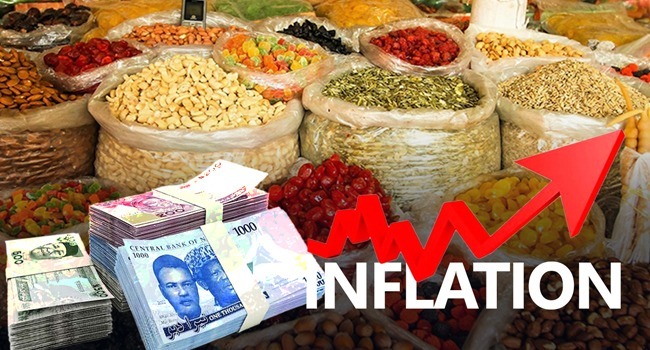Nigeria’s inflation rate has risen to 33.95% in May 2024, according to the latest data from the National Bureau of Statistics (NBS).
This represents a 0.26% increase from the 33.69% inflation rate recorded in April 2024, indicating a continued upward trend in the country’s inflation rate.
NBS disclosed this in its latest Consumer Price Index (CPI) report, which was released on Saturday.
On a year-on-year basis, the headline inflation rate in May 2024 was 11.54% points higher than the rate recorded in May 2023, which was 22.41%. This significant increase indicates that the headline inflation rate has risen substantially over the past year, highlighting the ongoing struggles with inflation in Nigeria.
However, on a month-on-month basis, the headline inflation rate in May 2024 was 2.14%, which was 0.15% lower than the rate recorded in April 2024 (2.29%).
According to the NBS, this means that the rate of increase in the average price level in May 2024 was less than the rate of increase in April 2024, providing a slight glimmer of hope in an otherwise bleak inflation landscape.
The food inflation rate in May 2024 was 40.66% on a year-on-year basis, which was 15.84% points higher than the rate recorded in May 2023 (24.82%).
The increase in food inflation was attributed to the rise in prices of essential items such as Semovita, Oatflake, Yam Flour, Garri, Beans, Irish Potatoes, Yam, Water Yam, Palm Oil, Vegetable Oil, Stockfish, Mudfish, Crayfish, Beef Head, Chicken, Pork Head, and Bush Meat.
These items are staples in Nigerian households, and the significant increase in their prices has a direct impact on the overall cost of living in the country.
“Like the month-on-month headline inflation, the month-on-month food inflation rate in May 2024 was 2.28%, which also shows a decrease of 0.22% compared to the rate recorded in April 2024 (2.50%).
“The fall in the Food inflation on a Month-on-Month basis was caused by a fall in the rate of increase in the average prices of Palm Oil, Groundnut Oil (under Oil and Fats Class), Yam, Irish Potatoe, Cassava Tuber (under Potatoes, Yam & Other Tubers Class), Wine, Bournvita, Milo, Nescafe (under Coffee, Tea and Coco Class).
“The average annual rate of Food inflation for the twelve months ending May 2024 over the previous twelve-month average was 34.06%, which was a 10.41% points increase from the average annual rate of change recorded in May 2023 (23.65%).”
The Central Bank of Nigeria (CBN) has attempted to combat rising inflation by raising the interest rates by 150 basis points from 24.75% to 26.25% in its May Monetary Policy Committee meeting.
This marks the third consecutive time the CBN has increased the Monetary Policy Rate (MPR) to combat the country’s soaring inflation levels.
The move is aimed at reducing the money supply in the economy and curbing inflationary pressures.
The surge in inflation has far-reaching implications for the Nigerian economy and its citizens. It erodes the purchasing power of consumers, reduces the value of money, and increases the cost of living.
The high inflation rate also has a negative impact on businesses, as it increases their costs and reduces their profitability.
The Nigerian government has pledged to address the inflationary pressures and improve the overall economy.

